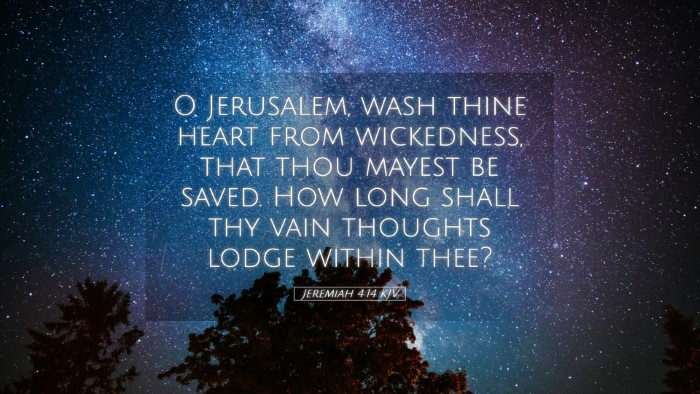Commentary on Jeremiah 4:14
Jeremiah 4:14 states: "O Jerusalem, wash your heart from wickedness, that you may be saved. How long shall your vain thoughts lodge within you?" This powerful verse compels readers to consider the importance of inner purity and the dire consequences of unrepentant sin. Below is a synthesis of insights drawn from esteemed public domain commentaries including those by Matthew Henry, Albert Barnes, and Adam Clarke.
Contextual Analysis
Before diving into the theological implications, it is crucial to understand the context of Jeremiah's prophetic message. Through this verse, Jeremiah addresses the nation of Judah, which was marred by idolatry and moral decay. As a prophet, Jeremiah received divine revelations concerning the consequences of these actions.
Historical Background
Henry notes that this period in Judah's history marked a significant juncture where the people faced imminent judgment. Babylonian invasions loomed, and this prophecy serves both as a warning and a call to repentance.
Theological Insights
Divine Call to Repentance
At the heart of Jeremiah 4:14 is the divine call to action: "wash your heart from wickedness." This phrase encapsulates the essential message of the need for repentance. Barnes expounds on this concept by emphasizing that true repentance is not merely external but internal — a cleansing of the heart rather than mere compliance with law.
Inner Transformation vs. External Ritual
Clarke observes that the call to "wash your heart" highlights a shift from the ritualistic practices that characterized Judaic worship toward an authentic transformation of the inner being. This reflects the biblical notion that God desires sincerity of heart over mere external observance.
The Nature of Wickedness
The reference to "wickedness" indicates a fundamental moral failing among the people. Matthew Henry elaborates on the various forms that wickedness takes, particularly in the hearts of those who have strayed from God’s commandments. In this light, the call to wash the heart involves recognizing personal sinfulness and actively seeking to align oneself with divine principles.
Practical Application
Examination of the Heart
In light of the exhortation, it is imperative for believers today to engage in self-examination. The question, "How long shall your vain thoughts lodge within you?" serves as a reflective prompt for congregational meditation. How often do we allow fleeting and fruitless thoughts to occupy our minds instead of anchoring ourselves in God’s truth?
Encouragement for Spiritual Renewal
Jeremiah encourages a proactive approach to spiritual renewal. As pastors and leaders, conveying this message of inner cleansing can be transformative for congregations in today’s world, where distractions abound. Emphasizing the need for continual heart purification can revive spiritual fervor and community commitment.
Conclusion
In summary, Jeremiah 4:14 serves as a profound reflection on the nature of repentance, the importance of inner purity, and the need for spiritual vigilance. The combined insights from Henry, Barnes, and Clarke illuminate these themes, making this passage a critical piece for theological study and application in pastoral ministry. Addressing the state of the heart is foundational to living a life reflective of God’s grace and holiness.
Reflections for Further Study
- What does it mean to "wash your heart" in a contemporary context?
- In what ways can church communities encourage one another towards inner transformation?
- How can the church address the distractions and "vain thoughts" of modern life?


